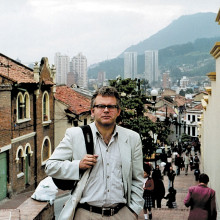Polish literature

Artur Domosławski
Born 1967, Artur Domosławski is a journalist and reporter. He is a graduate of the Theatre Studies Department at the National Academy of Dramatic Art in Warsaw. In the years 1991-2011, he worked as a journalist for Gazeta Wyborcza, and since 2011, he has worked for the weekly Polityka, also collaborating with the Polish edition of the monthly Le Monde Diplomatique. He received the Journalist of the Year Award in 2010 from Press.
In his debut book, Christ Without a Rifle: On the Pontificate of John Paul II [Chrystus bez karabinu. O pontyfikacie Jana Pawła II], which was an exploration of the political and social aspects of the pontificate of John Paul II, all of the characteristics of Domosławski’s writing style were already evident: attentiveness to a multisided description of reality, avoidance of hagiography, rejection of a Poland-centric perspective, the outlining of a wide historico-political context and social sensitivity.
His area of interest, above all, is Latin America, to which he has devoted two excellent books (Latin American Fever [Gorączka latynoamerykańska], 2004 and Death in Amazonia [Śmierć w Amazonii], 2013), as well as the alter-globalization movement and North-South relations (The World is Not For Sale [Świat nie na sprzedaż, Rozmowy o globalizacji i kontestacji], 2002; Rebellious America: Seventeen Dialogues on the Dark Sides of the Freedom Empire [Ameryka zbuntowana. Siedemnaście dialogów o ciemnych stronach imperium wolności], 2007, which received the Beata Pawlak Award).
Latin American Fever established Domosławski’s position as an outstanding reporter and expert on Latin America. In this book, he describes the complex socio-political situation in several Latin American countries, including Cuba, Chile, Mexico, Argentina, Peru, Brazil and Columbia. Domosławski disproves many myths about the continent and tries to understand the nature of Latinos’ political views. The book contains portraits of political leaders and common people, an explanation of the historical context and a journalistic story. In Death in Amazonia, Domosławski gives a behind-the-scenes look at the criminal activities of the Western mining industry in three countries (Brazil, Peru and Ecuador) and exposes its connections to global politics. He shows the effects of these activities and the influence they have on the everyday lives of average Europeans. His journalistic investigation ultimately leads to an analysis of the economic and political mechanisms by which relations between the global North and global South operate.
Domosławski received the most notoriety for his monumental, painstakingly researched biography of Ryszard Kapuściński (Ryszard Kapuściński: A Life [Kapuściński non-fiction], 2010). The book, written with empathy, but far from being hagiographic, triggered a great deal of controversy, even beyond the journalistic community. Domosławski presented Kapuściński as a figure of flesh and blood, a great man who did not lack flaws. He didn’t omit personal details (he was sued for infringement of privacy), nor did he conceal the fact that Kapuściński occasionally forfeited descriptive accuracy in his works for the sake of literary effect, and also distorted facts in order to prove the points he was trying to make. This aspect of the book triggered an intense discussion in Poland about reportage and its limitations and possibilities. Despite the controversy that the book aroused within Poland, it was translated into many languages (including English, French, Spanish and Italian) and was well-received abroad, where emphasis was placed on the fact that Domosławski was sympathetic towards his protagonist and usually gave him the benefit of the doubt. Due to the scope of the venture and the discussion which followed its publication, the book Ryszard Kapuściński: A Life has undoubtedly become one of the most important Polish biographical works.
BIBLIOGRAPHY
- Chrystus bez karabinu: o pontyfikacie Jana Pawła [Christ Without a Rifle: On the Pontificate of John Paul II], Warszawa: Prószyński i S-ka, 1999
- Świat nie na sprzedaż: rozmowy o globalizacji i kontestacji [The World is Not For Sale], Warszawa: Sic!, Gazeta Wyborcza, 2002
- Gorączka latynoamerykańska [Latin American Fever], Warszawa: Świat Książki, 2004
- Ameryka zbuntowana. Siedemnaście dialogów o ciemnych stronach imperium wolności [Rebellious America], Warszawa: Świat Książki, 2007
- Kapuściński non-fiction [Ryszard Kapuściński: A Life], Warszawa: Świat Książki, 2010
- Śmierć w Amazonii [Death in Amazonia], Warszawa: Wielka Litera, 2013
- Wykluczeni, Warszawa: Wielka Litera, 2016
TRANSLATIONS
Dutch:
- Kapusciński: non fictie [Kapuściński non-fiction], transl. Greet Pauwelijn, Breda: De Geus, 2013
English:
- Ryszard Kapuscinski: A Life [Kapuściński non-fiction], transl. Antonia Lloyd-Jones, Verso Books, 2012
French:
- Kapuściński. Le vrai et le plus que vrai [Kapuściński non-fiction], transl. Laurence Dyèvre, Paryż: Éditions des Arènes, 2011
German:
- Ryszard Kapuściński [Kapuściński non-fiction], transl. Antje Ritter-Jasińska, Benjamin Voelkel, Berlin: Rotbuch Verlag, 2013
Hungarian:
- Háborúk és forradalmak költője [Kapuściński non-fiction], transl. Hermann Péter, Budapeszt: Poligraf, 2011